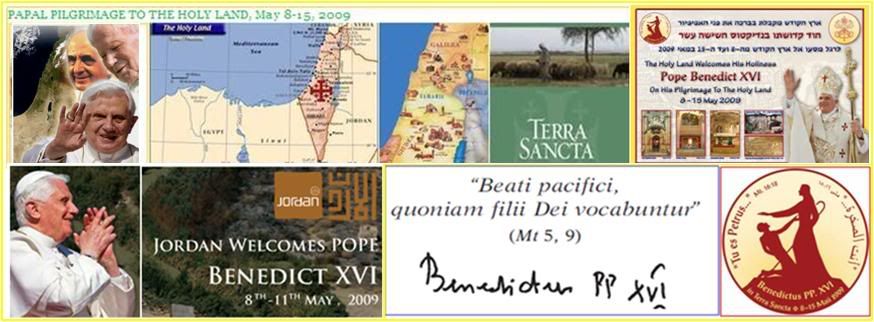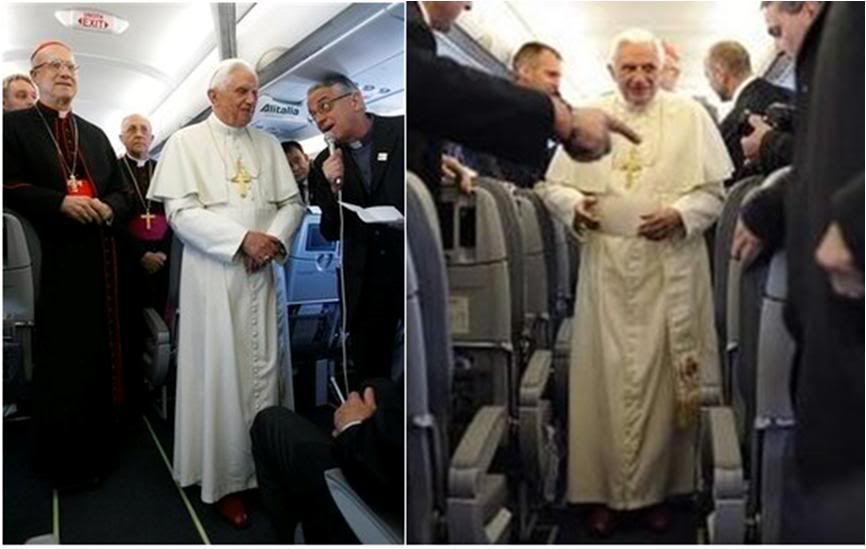| | | OFFLINE | | Post: 17.394
Post: 112 | Registrato il: 28/08/2005
Registrato il: 20/01/2009 | Administratore | Utente Junior | |
|

 THE POPE'S IN-FLIGHT INTERVIEW
THE POPE'S IN-FLIGHT INTERVIEW

The Holy Father gave his usual in-flight news conference en route to Amman, with the Vatican press director, Fr. Federico Lommbardi, reading out the four questions that the journalists on the flight had agreed to ask.
Here is a translation from the Italian transcript provided by VaticAn Radio:
FR. LOMBARDI: Holiness, we thank you very much for giving us this occasion for an encounter with you at the start of a trip that is so important and demanding,
It also gives us a chance to extend our best wishes for this trip and to tell you that we will work together to disseminate the messages that you will convey,
As usual, the questions that I will pose are the result of a collection of different questions from my colleagues who are present here. I will ask the questions only for logistical convenience, but they are the result of common work.
Holiness, this trip takes place in a time that is most sensitive for the Middle East, when there are strong tensions - following the crisis in Gaza, it was even thought that you might have to renounce making it. At the same time, a few days after your visit, the principal political leaders in Israel and the Palestinian Authority will be meeting with President Obama. Do you think you can contribute to the peace process which appears to have stalled?
Good day, I wish first of all to thank you for the work that you do. Let us all wish each other a good trip, a good pilgrimage, and a safe return.
As to the question, certainly, I will try to contribute to peace not as an individual but in the name of the Catholic Church, of the Holy See. We are not a political power, but a spiritual force, and this force is a reality that can contribute to progress in the peace process.
I see three levels. As believers, we are convinced that prayer is a true force. It opens the world to God. I think that if millions of persons, of believers, pray, then it can truly be a force that can influence and contribute to progress towards peace.
The second point: we seek to help in the formation of conscience. Conscience is the capacity of man to perceive the truth, but this ability is often blocked by particular interests. To be free of these interests, to be more open to the truth, to the real values, is a great commitment. It is a task of the Church to help recognize the true criteria, the true values, and thus free ourselves of particular interests.
Thus - the third point - we must talk to reason - that's really what it is: Precisely because we are not a political force, perhaps we can more easily see, even in the light of faith, what the real criteria are, help to understand their contribution to peace, and speak to reason, supporting those positions that are truly reasonable.
This we have done before and we want to continue doing so now and in the future.
Thank you, Holiness. The second question: You as a theologian have reflected particularly on the single root that Christians and Jews have in common. Why is it that, despite all the efforts at dialog, there are often occasions of misunderstanding? How do you see the future of dialog between the two communities?
What is important is that in truth, we do have the same root, the same books of the Old Testament, which are, for the Jews as for us, books of Revelation.
But naturally, after 2000 years of distinct histories, of being separated, it's not surprising that there should be misunderstandings, because each side has formed traditions of interpretation, of language, of thinking, which are very different - each with what one might call a very different 'semantic cosmos', so that the same word can mean different things for each side. This use of words which, in the course of centuries, have come to mean different things, obviously incurs misunderstanding.
So we must do all we can to learn each other's language, and it seems to me we would make great progress that way.
Today we have the possibility that young people, future teachers of theology, can study in Jerusalem, in the Hebrew University, and the Jews have academic contacts with us. Thus, there is an encounter between these different 'semantic cosmi'.
We learn reciprocally and we can go forward along the road of true dialog. If we learn from each other, I am sure, I am convinced, that we will make progress. And this will help peace, and even better, reciprocal love.
Holiness, this trip has two essential direections of inter-religious dialog, with Islam and with Judaism. Are these two directions completely separated from each other, or is there a common message that concerns all three religions that trace themselves back to Abraham?
Of course, there is a common message and there will be an occasion to make it.
Notwithstanding the diversity of our origins, we have common roots because, as it has been said, Christianity was born out of the Old Testament, and the writings of the New Testament would not exist without the Old Testament.
But even Islam was born in a climate where both Judaism as well as Christianity in its many branches was present - Judaeo-Christianity, Antiochian-Byzantine Christianity, etc., and all these circumstances are reflected in the Koranic tradition.
And so we have so much in common, in our origins and in our faith in the one God. So it is important, on the one hand (for Christianity) to have a two-part dialog - with the Jews and with Islam - and then even a trilateral dialog.
I myself was co-founder of a foundation for dialog among the three monotheistic religions, in which personalities like Metropolitan Damaskinos and the Grand Rabbi of France, René Samuel Sirat, etc.
worked together, and this foundation even prepared an edition of the books of these three religions - the Koran, the Old Testament and the New Testament.
Thus, the trilateral dialog should also move forward - it is most important for the peace and even, we might say, for living well one's own religion.

One last question. Holiness, you have often referred to the problem of the diminishing Christian community in the Middle East, even the Holy Land, in particular. It is a phenomenon with diverse political, economic and social character. What can be done concretely to help the Christian presence in the region? What contribution to you expect to make with this trip? Is there a hope for the future of these Christians? And will you have a special message for the Christians of Gaza who will be coming to meet you in Bethlehem?
Certainly, there is hope because, as you said, even the situation today which is difficult, is also a time of hope for a new beginning, of a new impulse along the road to peace.
We want to encourage Christians in the Holy Land and all the Middle East to stay and give their contributions to their nations of origin: they are a very important component of life in this region.
Concretely, the Church - besides words of encouragement, besides praying together - has its schools and hospitals. In this sense we have a very concrete and real presence.
Our schools are forming a generation which will have the possibility to take part in the life of today, in public life. We are creating this Catholic university in Jordan - I think it is a great project = in which young people, Muslims as well as Christians, can meet each other and learn together, while forming a Christian elite which is prepared precisely to work for peace.
But in general, our schools are a most important opportunity to open up the future for Christians, and our hospitals demonstrate our presence. Besides, there are several Christian associations who help Christians in different ways, and encourage them to stay on with concrete assistance.
And so, I hope that Christians here will truly find the courage, the humility, and the patience to stay in these countries, to offer their contribution to the future of these countries.
FR. LOMBARDI: Thank you, Holiness. With this. you have helped us to orient our trip from a spiritual as well as cultural standpoint, and I renew our best wishes, in behalf of all the colleagues on this flight, as well as those who are travelling towards the Holy Land at this time, to take part, from the information aspect, in your very demanding mission. A good journey to you and all your co-workers, and good work to our colleagues.
 |